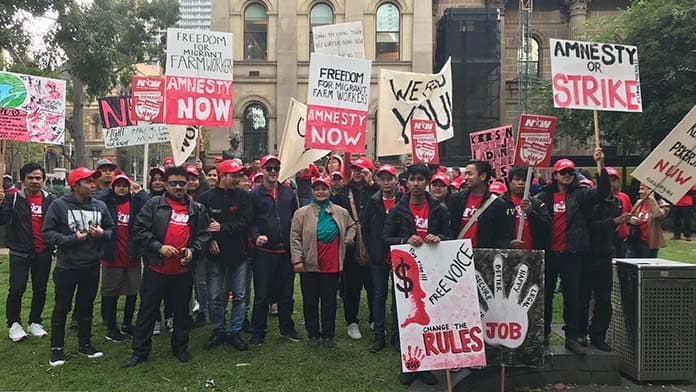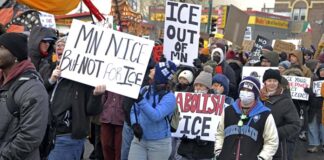Solidarity’s Chris Breen spoke to Shawfikul Islam, a Rohingya refugee and National Union of Workers (NUW) organiser in Melbourne, about the union’s organising amongst farm workers and its call for an amnesty for migrant workers in the industry
Can you tell me a bit about the NUW Farm Workers campaign?
At the start when we went to the sites the workers would hide and thought we were from the Immigration Department or some other organisation. The contractors would intimidate them and make them scared.
Gradually we built trust and workers have become more confident to speak to us on site. We have been doing this for two or three years and now we are receiving calls from different farms from workers saying they want to be part of the union.

At one of our first farm sites before we got there some people were working $12.50 per hour and after we got there they started to receive Award wages. Just a year later we had an enterprise bargaining agreement. Everyone was a casual before but after bargaining we have created a lot of full-time jobs and a wage increase. Recently we had OH&S representatives introduced all over the farms and in the shed areas as well.
That agreement was in English and we have translated it into Burmese, Vietnamese, Cambodian and Malaysian for people working there so they understand it in their own language.
I was involved in a poultry site in Nhill and there are Karen refugees and I arranged during the bargaining process that the company should arrange translation to Karen because the majority of workers are Karen.
This year the Victorian and Queensland governments have introduced labour hire licensing so that labour hire firms and contractors in the farm industry in the future will have to have to have a licence to be able to hire workers. If they are not paying tax or proper wages they will receive significant fines.
What are the main issues for farm workers?
When we go to another industry we are talking about the Award, about pay rates and issues about the site.
When we deal with the farm workers we have to take on all of their issues. Their visa status is the most difficult.
More than 90 per cent of people have visa issues of different sorts. We have had to adjust our organising tactics to deal with these issues.
What sort of visa issues do they have?
Often people have paid unlicensed agents who have applied for a visa for them and the applications are of a poor quality so they are stuck in a dead end visa process or have overstayed through ignorance.
I came from Burma as a refugee, but I speak enough English to stand up to the contractors or the company. Sometimes people are scared. Even some people with permanent residency visas have problems with language and [accessing] the Centrelink system. All of those things make it easy for companies to exploit them.
In the farm industry there is a really high demand for workers. Labour hire companies [used as middlemen to recruit workers for the farms] exploit a lot of people.
A lot of people in the farms really want to speak up but their visa [situation makes] it hard. People who have overstayed visas have fears, and even those on bridging visas, temporary visas or student visas still have a lot of fears about their status. Sometimes they have a visa but they don’t have work rights, but they have to work to survive.
Why is the NUW calling for an amnesty for farm workers?
Our campaign is about dignity. These people are doing hard work for the community. Through Australian history migrant workers and refugees have been a big part of helping develop the country.
The NUW wants an amnesty to assist the thousands of workers in Australia who have no work rights at all and others who have been duped and tricked by unlicensed agents and therefore are likely to be running into a dead end with their visa applications.
Our policy is built around an amnesty and a transition of Malaysians and Indonesians onto their own seasonal worker programme similar to the one currently available for workers from the pacific.
We believe our policy would lead some people to obtaining permanent residency and others to at least have a legal way to work in Australia and potentially an opportunity to continue working here on an ongoing basis.
The amnesty is just one aspect of the visa reform we are suggesting. We also want to see the SHEV and TPV visas abolished so that those that came by boat can follow a normal protection visa pathway and be able to claim their rights as a refugee.
Additionally we think all temporary visa workers need protections built in around access to unions and civil society and we think visas that restrict someone’s capacity to work like the student visa and the working holiday visa also need reform so that people are not separated and restricted from enforcing their workplace rights. We would like to see the mandatory 88 days in regional areas abolished for working holiday makers.






